AWM41 1045 - [Nurses Narratives] N F S Smith - Part 1
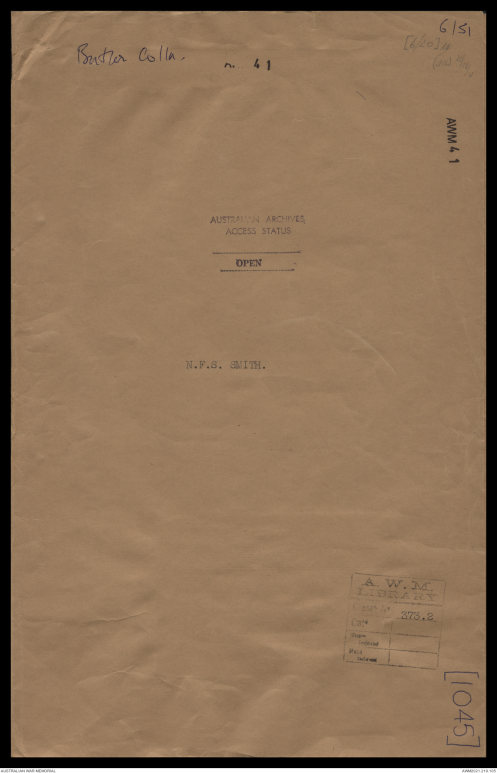
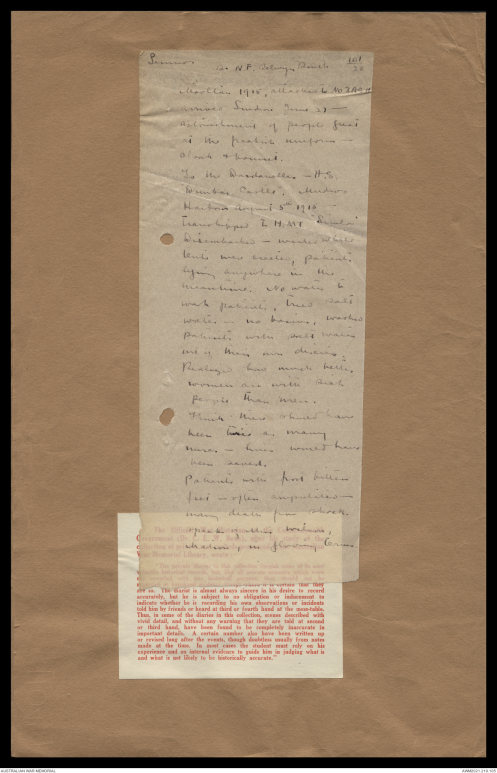
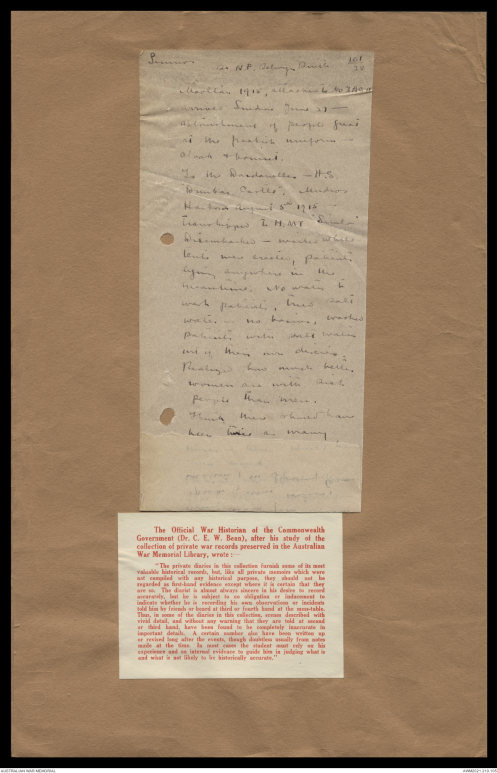
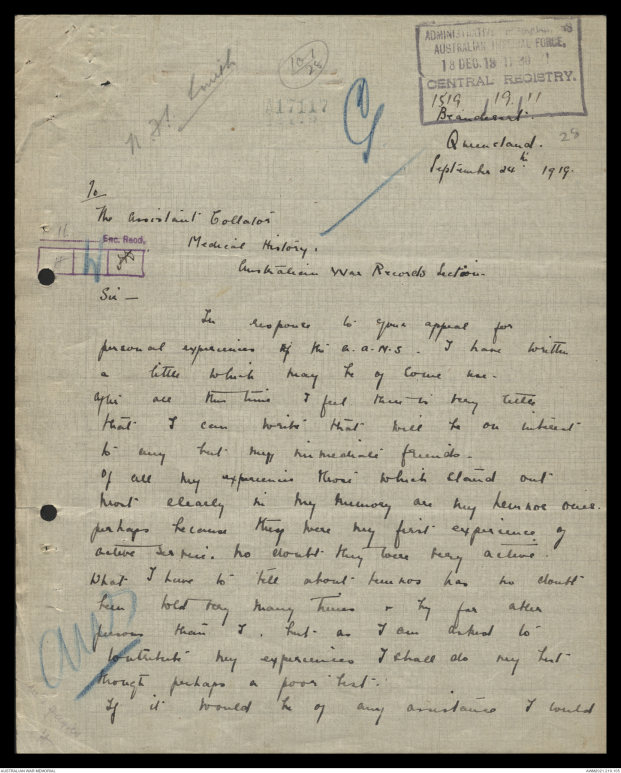
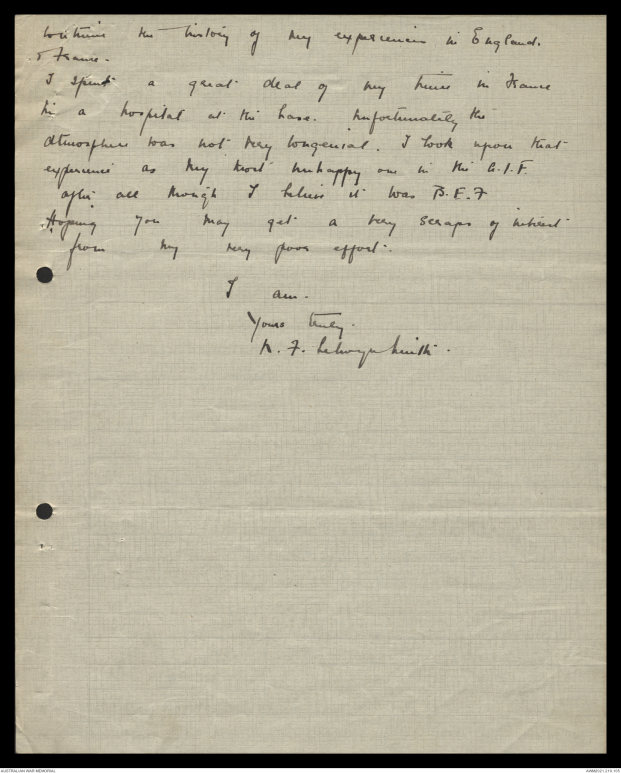
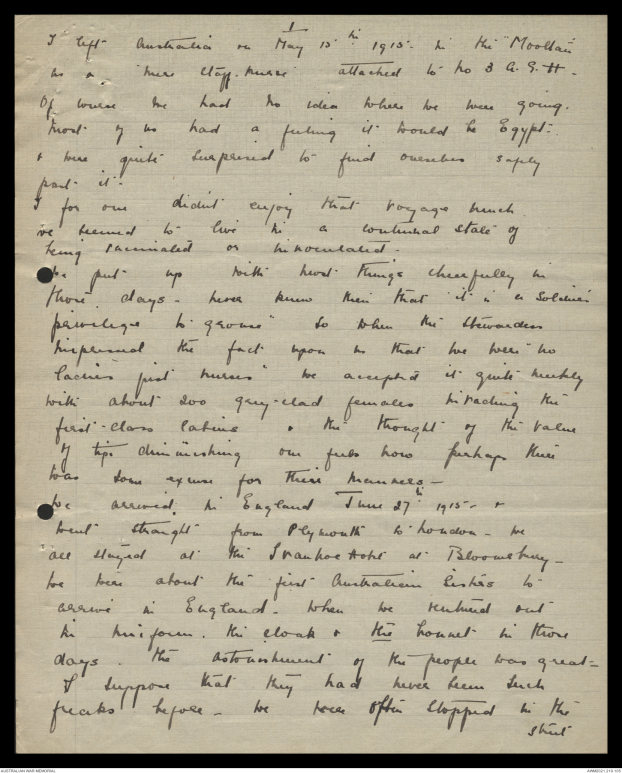
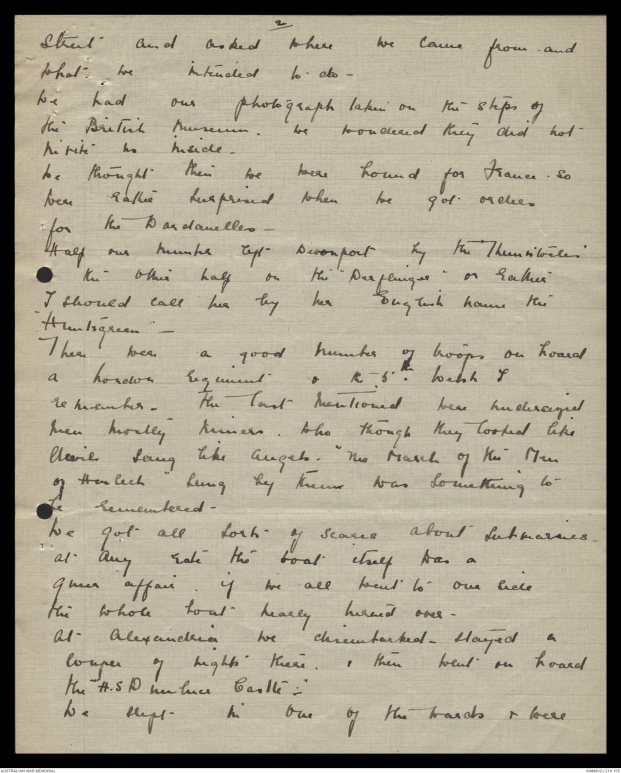
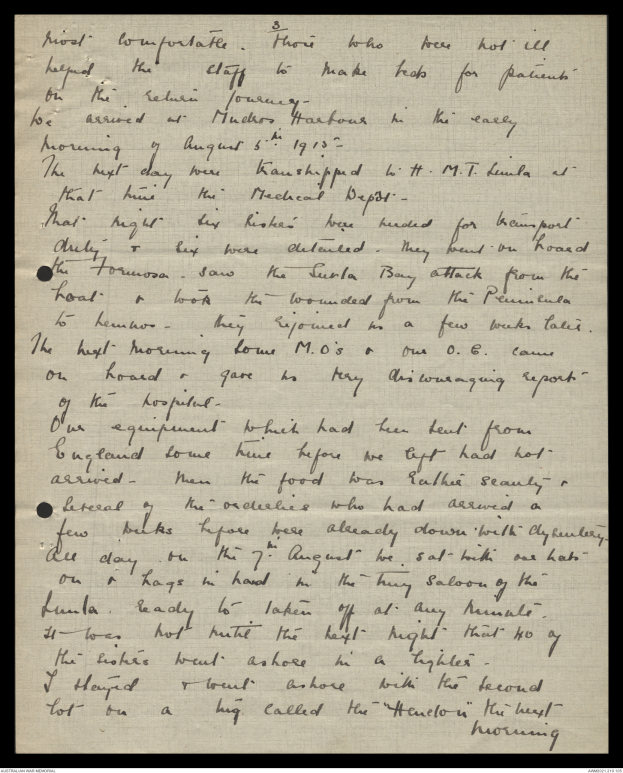
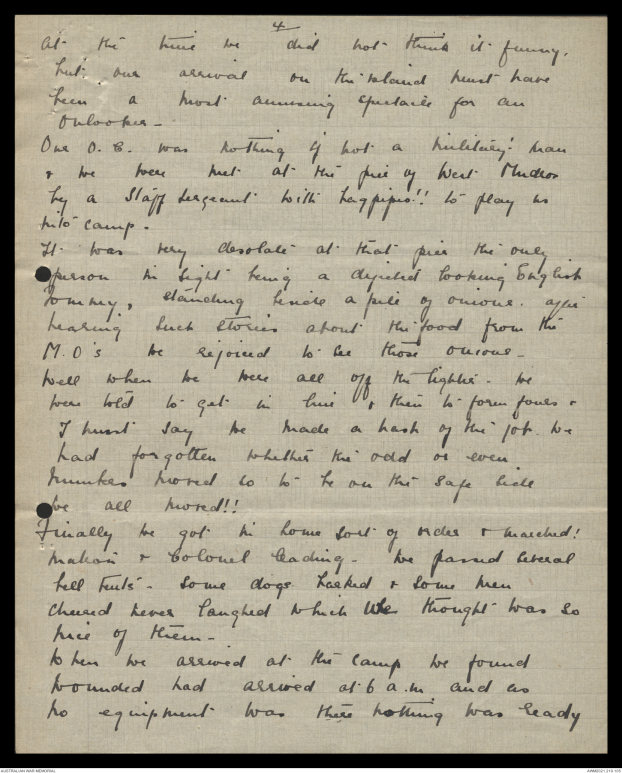
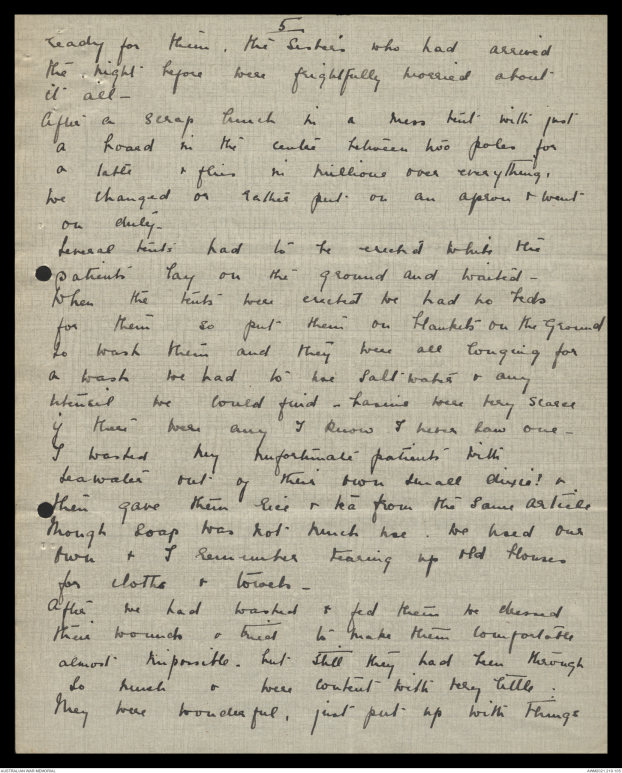
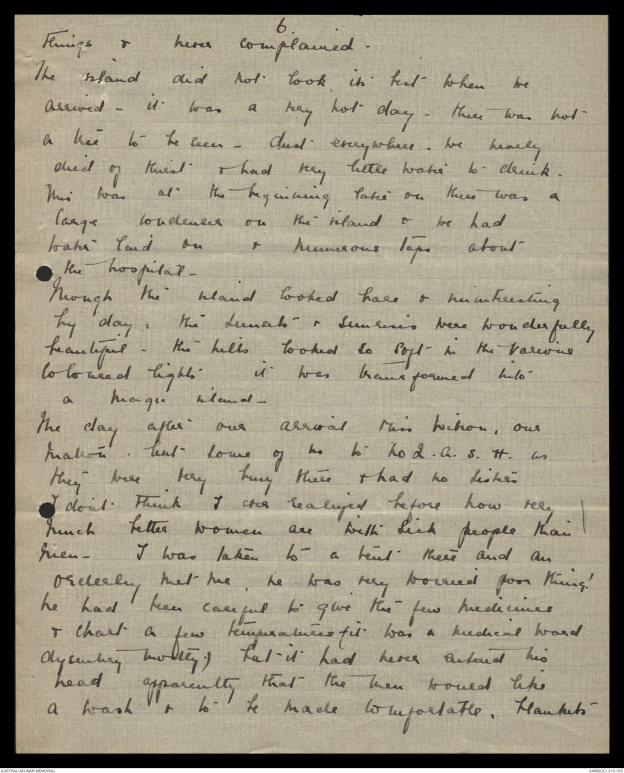
Butler Colln.
6151
[6/20] 4
AWM 41
AUSTRALIAN ARCHIVES
ACCESS STATUS
OPEN
N.F.S. Smith.
AWM
LIBRARY
[[?]] 373.2
[1045]
Lemnos
141/24
Dr. N.F. Selwyn Routh
Mooltan 1915 attached to No 244
arrived London June 21 -
astonishment of people just
at the practical uniforms -
cloak & bonnet
To the Dardanelles 1915 - H.S.
Dunbar Castle, Mudros
Harbour August 5th 1915
Transhipped L.H.M.T "Swindon"
Disembarked - worked while
tents were erected, patients
lying anywhere in the
meantime. No water to
wash patients, tried salt
water - no basins, washed
patients with salt water
out of Mens own dixies
Realised how much better
women are with sick
people than men.
Think there should have
been twice as many
nurses - lives would have
been saved.
Patients with frost bitten
feet - often amputation -
many died from shock.
speak to Miss Wilma Matron. in glowing terms
are so. The diarist is almost always sincere in his desire to record
accurately , but he is subject to no obligation or inducement to
indicate whether he is recording his own observation or incidents
told him by friends or heard at third or fourth hand heard at the mess-table
Thus, in some of the diaries in this collection, scenes described with
vivid detail, and without any warning that they are told at second
or third hand have been found to be completely inaccurate in
important details. A certain number have been written up
or reviewed long after the events, though doubtless usually from notes
made at the time in most cases the student must rely on his
experience and on internal evidence to guide him in judging what is
and what is not likely to be historically accurate."
Lemnos
141/24
Dr. N.F. Selwyn Routh
Mooltan 1915 attached to No 244
arrived London June 21
astonishment of people just
at the practical uniforms -
cloak & bonnet
To the Dardanelles 1915 - H.S.
Dunbar Castle, Mudros
Harbour August 5 1915
Transhipped L.H.M.T. Swindon
Disembarked - worked while
tents was erected, patients
lying anywhere in the
meantime. No water to
wash patients, tried salt
water - no basins, washed
patients with salt water
out of Mens own dixies
Realised how much better
women are with sick
people than men.
Think there should have
been twice as many
nurses-lives would have
been saved.
Patients with frost bitten
feet - often amputation -
many died from shock.
speak to Miss Wilma Matron. in glowing terms
The Official War Historian of the Commonwealth
Government (Dr. C. E. W. Bean), after his study of the
collection of private war records preserved in the Australian
War Memorial Library, wrote:-
"The private diaries in this collection furnish some of its most
valuable historical records, but, like all private memoirs which were
not compiled with any historical purpose, they should not be
regarded as first-hand evidence except where it is certain that they
are so. The diarist is almost always sincere in his desire to record
accurately, but he is subject to no obligation or inducement to
indicate whether he is recording his own observations or incidents
told him by friends or heard at third or fourth hand at the mess-table.
Thus, in some of the diaries in this collection, scenes described with
vivid detail, and without any warning that they are told at second
or third hand, have been found to be completely inaccurate in
important details. A certain number also have been written up
or revised long after the events, though doubtless usually from notes
made at the time. In most cases the student must rely on his
experience and on internal evidence to guide him in judging what is
and what is not likely to be historically accurate".
N F S Smith
101/28
ADMINISTRATION [[?]]
AUSTRALIAN IMPERIAL FORCE
18 DEC 18 [[?]]
CENTRAL REGISTRY.
1519 19.11
Beaudesert
Queensland.
September 24th 1919
[[*28*]]
17117
[[?]]
[[16*E Recd*]]
To
The Assistant Collator
Medical History,
Australian War Records.
Sir -
In response to your appeal for
personal experiences of the A.A.N.S. I have written
a little which may be of some use.
After all this time I feel there is very little
that I can write that will be an interest
to many but my immediate friends.
Of all my experiences those which stand out
most clearly in my memory are my Lemnos ones.
perhaps because they were my first experience of
active service. No doubt they were very active.
What I have to tell about Lemnos has no doubt
been told very many times and by far other
persons than I. but as I am asked to
contribute my experiences, I shall do my best
though perhaps a poor best.
If it would be of any assistance I could
AWB
continue the history of my experiences in England,
& France.
I spent a great deal of my time in France
in a hospital at the base. Unfortunately the
atmosphere was not very congenial. I look upon that
experience as my most unhappy one in the A.I.F.
After all though I believe it was B.E.F
Hoping you may get a very scraps in interest
from my very poor effort.
I am
Yours truly
N.F. Selwyn Smith
1
I left Australia on May 15th on the "Mooltan"
as a mere staff nurse attached to No 3 A.G.H.
Of course we had no idea where we were going.
Most of us had a feeling it would be Egypt.
& were quite surprised to find ourselves safely
past it.
I for one didn't enjoy that voyage much.
We seemed to live in a continual state of
being vaccinated or innoculated.
We put up with most things cheerfully in
those days - hence knew then that it is a Soldier's
privilege to grouse so when the Stewardess
impressed the fact upon us that we were "no
ladies just nurses" we accepted it quite meekly
with about 200 grey-clad females impacting the
first-class cabins & the thought of the value
of trips diminishing one feels how perhaps there
was no excuse for these manners. -
We arrived in England Thurs 27th 1915 - &
went straight from Plymouth to London - we
all stayed at the Ivanhoe Hotel at Bloomsbury -
we were about the first Australian Sisters to
arrive in England. When we ventured out
in uniform. the cloak & the bonnet in those
days. the astonishment of the people was great -
I suppose that they had never seen such
freaks before - we were often clapped in the
street
2
street and asked where we came from and
what we intended to do.
We had our photograph taken on the steps of
the British Museum. we wondered they did not
invite us inside.
We thought then we were bound for France - so
were rather surprised when we got orders
for the Dardanelles -
Half our number left Devonport by the Themintoeles
the other half on the 'Derflinger' or rather
I should call her by her English name the
"Huntsgreen" -
There were a good number of troops on board
a London regiment & the 5th Welsh I
remember - The last mentioned were undersized
men mostly Miners. who though they looked like
devils sang like angels. "The March of the Men
of Harlech" sung by them was something to
be remembered.
We got all sorts of scares about Submarines.
at any rate the boat itself was a
grim affair. if we all went to one side
the whole boat nearly turned over.
At Alexandria we disembarked - stayed a
couple of nights there & then went on board
the A.S.D. Dunluce Castle -
We slept in one of the wards & were
3
most comfortable. those who were not ill
helped the staff to make beds for patients
on the return journey.
We arrived at Mudros Harbour in the early
morning of August 5th 1915 -
The next day we transhipped to H.M.T. [[Leirla?]] at
that time the Medical Depot -
That night six Sisters were needed for transport
duty & six were detailed, they went on board
the Formosa. saw the Suvla Bay attack from the
boat & took the wounded from the Peninsula
to Lemnos. they rejoined us a few weeks later.
The next morning some M.O.'s & one O.C. came
on board & gave us very discouraging report
of the hospital.
Our equipment which had been sent from
England some time before we left had not
arrived - then the food was rather scanty &
several of the orderlies who had arrived a
few weeks before were already down with dysentery.
All day on the 7th August we sat with our hats
on & bags in hand in the tiny saloon of the
Suvla. ready to taken off at any minute.
It was not until the next night that 40 of
the Sisters went ashore in a lighter.
I stayed & went ashore with the second
lot on a tug called the "Henelon" the next
morning
4
At the time we did not think it funny,
but our arrival on the island must have
been a most amusing spectacle for an
onlooker -
Our O.C. was nothing if not a Military man
& we were met at the pier of West Mudros
by a Staff Sergeant with bagpipes!! to play us
into camp.
It was very desolate at that pier the only
person in sight being a dejected looking English
Tommy, standing beside a pile of onions. After
hearing such stories about the food from the
M.O.'s we rejoiced to see those onions -
Well when we were all off the lighter - we
were told to get in line & then to form fours &
I must say he made a hash of the job. We
had forgotten whether the odd or even
numbers moved so to be on the safe side
we all moved!!
Finally we got in some sort of order & marched!
Matron & Colonel leading. We passed several
bell tents - some dogs barked & some men
cheered never laughed which we thought was so
nice of them.
When we arrived at this camp we found
wounded had arrived at 6 a.m. and as
no equipment was there nothing was ready
5
ready for them. The Sisters who had arrived
the night before were frightfully worried about
it all.
After a scrap lunch in a mess tent with just
a board in the centre between two poles for
a table & flies in millions over everything,
we changed or rather put on an aprons & went
on duty.
Several tents had to be erected while the
patients lay on the ground and waited -
When the tents were erected we had no beds
for them so put them on Blankets on the ground
to wash them and they were all longing for
a wash we had to use salt water & any
utensil we could find - basins were very scarce
if there were any I know I never saw one -
I washed my unfortunate patients with
seawater out of their own small dixie! &
then gave them rice & tea from the same article
though soap was not much use. We used our
own & I remember tearing up old blouses
for cloths & towels.
After we had washed & fed them we dressed
their wounds & tried to make them comfortable
almost impossible. but still they had been through
so much & were content with very little.
They were wonderful, just put up with things
6.
things & never complained.
The island did not look its best when we
arrived - it was a very hot day - there was not
a tree to be seen - dust everywhere - we nearly
died of thirst & had very little water to drink.
This was at the beginning later on there was a
large condenser on the island & we had
water laid on & numerous taps about
the hospital.
Though the island looked bare & uninteresting
by day, the sunsets & sunrises were wonderfully
beautiful. the hills looked so soft in the various
coloured lights it was transformed into
a magic island.
The day after our arrival Miss Wilson, our
Matron but some of us to No 2 A.G.H. as
they were very busy there & had no Sisters.
I don't think I ever realized before how very
much better women are with sick people than
men. I was taken to a tent there and an
orderly met me, he was very worried poor thing!
he had been careful to give the few medicines
& chart a few temperatures (it was a Medical Ward
dysentery mostly) but it had never entered his
head apparently that the men would like
a wash & to be made comfortable. blankets
 Sam scott
Sam scottThis transcription item is now locked to you for editing. To release the lock either Save your changes or Cancel.
This lock will be automatically released after 60 minutes of inactivity.